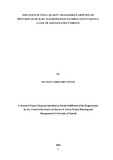| dc.description.abstract | According to Water Services Regulatory (WASREB) Report on Performance Review of Kenya’s Water Services Sector 2011-2012, Amatsi water Services Company limited have total population of 265,000 in the service area, population served is 43,676, total number of water connection is 5558, total active connection is 2475 and approximately losing 70% of its treated, clean, safe and potable water in form of Non Revenue Water (NRW) this is water that is majorly lost through pipe leakages and bursts which is as result of poor quality workmanship during installation or poor quality pipe fittings and water meters that doesn't give quality records on amount of water that has passed through them, illegal connection and reconnection of water supply to customers. According to inspection report by LVNWSB for the first quarter for the month of July, August and September 2013 indicated that, only 16% of the population and half total active customers in the service area are irregularly being served with water services for example; September 2013, billing for water services was Kshs. 1,934,010 while total revenue collected for the same month was Kshs. 796,290 and total expenses was Kshs. 2,190,561 making a loss of Kshs.1, 394,271. Therefore, with proper implementation of total quality management in provision of quality water services the Company can satisfy most of its customers, reduce NRW, increase population served in the area, active water connection and collection efficiency. These challenges will only be addressed well with a research on the influence of adoption of total quality management on provision of quality water services in Amatsi Water Company. The purpose of this study was to assess, determine and examine the influence of adoption of total quality management on provision of quality water services in Vihiga County, the case of Amatsi Water Company. The objective of the study was to establish the extent to which customer satisfaction, teamwork, employee involvement and continuous improvement activities influences provision of quality water services. The study targeted board of directors of both AWSC and LVNWSB and the Company staff. Members of the two boards are 20 in number while the staff of the company is approximately 60 in number. This study targeted all the employees and board of Directors totaling to 80 as approximate target population. A semi-structured research questionnaire was designed for administering to the Board of Directors. Questionnaire was administered to Amatsi Company staff. The validity of the instruments was ascertained by the pilot study. This ensured that the instructions were clear and all possible responses to each question were captured. In the study, content validity was determined by consulting the judgment of research supervisors within the University. The University supervisors reviewed the instruments, recommended for improvements and verify whether the instruments were able to address the objectives of the study. The researcher administered the same questionnaires twice to pilot respondents at Maseno water supply scheme and their responses correlated independently to ensure reliability, which was found to be 0.867 and significant. The results were analyzed using frequency counts, percentages, Pearson product moment correlation for relationship between the dependent variable and provision of quality water services. The results revealed that customer satisfaction, employee involvement, teamwork and continuous improvement of provision of quality water services were positively correlated to provision of QWS. However, continuous improvement had more influence on the provision of QWS and accounted for 51.0% of change in the provision of QWS. It was concluded that continuous improvement be intensified to enhance provision of QWS and both management and staff be educated to enhance their coordination of teamwork. The findings are relevant to the companies for the purposes of providing QWS. | en_US |



